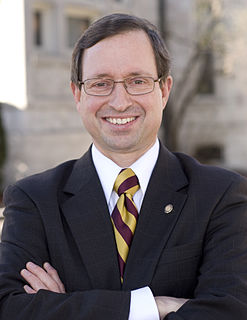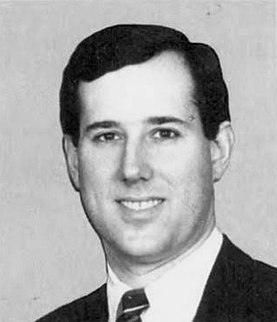
Robert Patrick Casey Sr. was an American politician from Pennsylvania. A member of the Democratic Party, he served as the 42nd Governor of Pennsylvania from 1987-95. He previously served as a state senator (1963–68) and Auditor General of Pennsylvania (1969–77).

The 2006 United States Senate elections were held on November 7, 2006, with all 33 Class 1 Senate seats being contested. The term of office for those elected in 2006 ran from January 3, 2007, to January 3, 2013. Prior to the election, the Republican Party controlled 55 of the 100 Senate seats.

The Pennsylvania gubernatorial election of 2006 was held on November 7, 2006 and included the races for the Governor of Pennsylvania and Lieutenant Governor of Pennsylvania.

Catherine Baker Knoll was an American politician and member of the Democratic Party. She was the 30th Lieutenant Governor of Pennsylvania, serving under Governor Ed Rendell from 2003 to 2008.

The 2006 United States Senate election in Montana was held November 7, 2006. The filing deadline was March 23; the primary was held June 6. Incumbent Republican Conrad Burns was running for re-election to a fourth term, but was defeated by Democrat Jon Tester by a margin of 0.87%, or 3,562 votes out of 406,505 votes.
The Republican Party of Pennsylvania, commonly known as the PA GOP, is based in Harrisburg in the United States state of Pennsylvania. It is affiliated with the Republican Party of the United States.

The 2010 United States Senate election in Pennsylvania took place on November 2, 2010, during the 2010 midterm elections. Incumbent Republican-turned-Democrat U.S. Senator Arlen Specter ran for reelection to a sixth term, but lost in the Democratic primary to Joe Sestak. Republican nominee Pat Toomey then won the seat.

Samuel E. "Sam" Rohrer is an American businessman and politician. A member of the Republican Party, he served as a member of the Pennsylvania House of Representatives from the 128th District.

The 2004 United States Senate election in Pennsylvania was held on November 2, 2004. Incumbent Republican U.S. Senator Arlen Specter won re-election to a fifth term.
Glen Meakem is an American entrepreneur and founder & CEO of a permanent cloud photo storage and sharing company called Forever. He is also a former radio host based in Pittsburgh, Pennsylvania.

The 1994 United States Senate election in Pennsylvania was held November 8, 1994. Incumbent Democratic U.S. Senator Harris Wofford, who was recently appointed to the position in 1991, decided to seek re-election to a full six-year term, but was defeated by Republican Rick Santorum.
Robert Richard Guzzardi is an American attorney, real estate developer, conservative financier, and political activist. He is best known for his efforts to elect "reform Republican" candidates to the Pennsylvania General Assembly after the 2005 Pennsylvania General Assembly pay raise controversy.

The Pennsylvania gubernatorial election of 1978 was held on November 7, 1978 between Republican Dick Thornburgh and Democrat Pete Flaherty.

The Democratic primary for the 2010 United States Senate election in Pennsylvania took place on May 18, 2010, when Congressman Joe Sestak defeated incumbent Arlen Specter, which led to the end of Specter's five-term Senatorial career. Just prior to the start of the primary campaign, after serving in the Senate as a Republican for 29 years, Specter had switched to the Democratic Party in anticipation of a difficult primary challenge by Pat Toomey; Sestak was ultimately defeated by Toomey in the general election. Political observers and journalists described the race between Specter and Sestak as one of the bitterest and most watched of all the 2010 primary elections.

The 2012 United States Senate election in Pennsylvania was held on November 6, 2012, alongside a presidential election, other elections to the United States Senate in other states, as well as elections to the United States House of Representatives and various state and local elections. Incumbent Democratic U.S. Senator Bob Casey, Jr. ran for and won re-election to a second term, defeating Republican nominee Tom Smith, and Libertarian nominee Rayburn Smith.

Robert Patrick Casey Jr. is an American attorney and politician serving as the senior United States Senator from Pennsylvania, a seat to which he was first elected in 2006. He previously served as Pennsylvania Auditor General from 1997 to 2005 and as Pennsylvania Treasurer from 2005 to 2007.

Former Senator Rick Santorum of Pennsylvania began a campaign for the 2012 Republican Party nomination for president of the United States in April 2011. He had been preparing for a run since shortly after the 2008 presidential election.

The 2016 presidential campaign of Rick Santorum, former United States Senator from Pennsylvania, was formally announced at a rally in Pittsburgh on May 27, 2015. His campaign for the Republican nomination for President of the United States in 2016 was his second bid for the office, after having been a candidate in 2012, where he received the second most delegates after 2012 nominee Mitt Romney.
























